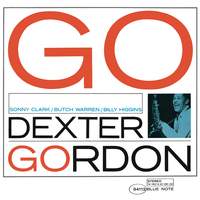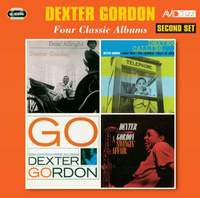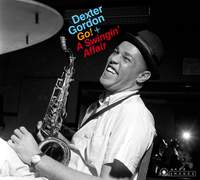Classic Recordings,
Dexter Gordon, 'Go!'

An immeasurable influence on jazz players inside and outside of the bebop tradition, the saxophonist Dexter Gordon celebrated his centennial this year (27th February, to be exact). Part of the first wave of early bebop innovators, Gordon was cut from the same cloth as other players like Charlie Parker and Dizzy Gillespie, a key touchstone for the next generation of players like John Coltrane and Sonny Rollins. Gordon was one of the first players to bring the tenor saxophone into the context of bebop, having begun his music career in the late 1940s, but his work began to dwindle in the ‘50s due to legal issues and struggling with a heroin addiction. It was 1961, however, when things began to turn around; signing to Blue Note records and resuming regular live performances, this period of Gordon’s life is often referred to as his ‘New York Renaissance’, returning to music for what would be a lifelong career.
Gordon already had an impressive number of recordings to his name by the time he signed with Blue Note, and although he’d split his solo recording career between other labels like SteepleChase, his relationship with Blue Note endured for many years – some sessions were even released posthumously up to three decades after their original recording. While he spent much of the rest of the 1960s living in Europe – mostly between Paris and Copenhagen – this short string of Blue Note albums starting with 1961’s Doin’ Allright up to 1964’s A Swingin’ Affair mark some of the most essential recordings of his career, with Go! landing right in the middle of this stint. That’s not to say these were the only key recordings made by Gordon for Blue Note, of course; his similarly acclaimed One Flight Up would later come in 1965, recorded at CBS Studios while the saxophonist was in Paris.

Save for the energetic original ‘Cheese Cake’ that opens the record, it’s a pretty standard-heavy affair, and it’s tracks like ‘Second Balcony Jump’ that give you a sense of Gordon’s approach to the sax; a full, throaty tone with tons of presence and precise note choice. His tendency to play firmly behind the beat can sometimes take a little getting used to, but feels anything but unintentional as well as showcasing the tight rhythm section of bassist Butch Warren and drummer Billy Higgins. Gordon also makes frequent use of quotation in his improvisations, hardly unheard of in jazz but something he’d often utilise as a way of reducing the distance between performer and audience; as a result his style of soloing isn’t the most technical you’ll hear, almost more akin to a vocalist, and tastefully lyrical.
The two ballads on the record, ‘Guess I’ll Hang My Tears Out to Dry’ and ‘Where Are You?’ break up the otherwise mostly uptempo numbers on the album, but even taking the tempo down a touch there’s a palpable energy to the quartet on these tunes. It’s hardly a novel take to say that Go! stands out not only in Dexter Gordon’s catalogue, but in Blue Note’s too; if there’s a debate to be had for the ideal early bebop album, Go! is certainly one of the highest contenders.
Go! is available in a few different editions...
Available Formats: MP3, FLAC, Hi-Res FLAC, Hi-Res+ FLAC
Available Format: 2 CDs
Includes 16-page booklet with photos by Francis Wolff
Available Format: CD





